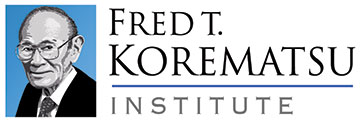Day of Remembrance
“… [this is] about our civil liberties and the Constitution and that’s what’s at risk. We all can see that and this is not a Republican or a Democrat or an Independent or a political type of issue. This is about our democracy. This is about our Constitution, and we all need to work to uphold and preserve our Constitution.” – Dr. Karen Korematsu, Roosevelt Four Freedom Award Acceptance for Fred T. Korematsu, October 2021
It was over eight decades ago when the U.S. government put more than 100,000 Japanese immigrants and American citizens of Japanese descent into concentration camps based on their ethnicity, following the Japanese attack on Pearl Harbor. That number would grow to 125,000 by the time World War II ended in 1945. Lives were upended, homes were lost, and families uprooted from their communities. The Japanese American Incarceration remains one of the most consequential events in our American story and the repercussions have permeated civil rights, civil liberties and legal debates for decades. And it isn’t a dark part of our history that should be left in the history books. We have seen the same ideology and argument rear its ugly head post-9/11 in the treatment of Muslim Americans, the “Muslim ban” of 2017, and the hate speech and suggested policies that popped up in response to the COVID-19 pandemic. So, targeting various communities based purely on their ethnicity is an important part of our history we should ALL know.
The freedom of religion. The right to vote. The right to keep and bear arms. In the United States of America, our civil liberties are fundamental rights and freedoms that have been laid down on parchment since the country’s earliest days. Everyone feels they know the biggest hits, the most talked about freedoms, of the U.S. Constitution, or at the least the top ten in the Bill of Rights. However, the Equal Protection Clause in the first section of the Fourteenth Amendment to the United States Constitution may seem outdated, a remnant of past era when it feels like everyone should be treated equally in the modern era. The clause, dating from 1868, states “nor shall any State … deny to any person within its jurisdiction the equal protection of the laws.” Simply put, individuals in similar situations should be treated equally by the law. But in this day in age are we all really treated equally? In recent years, the 14th Amendment was the basis for Obergefell v. Hodges which legalized same-sex marriages less than a decade ago in 2015, and before that, it was the basis for Brown v. Board of Education. This Supreme Court decision helped to dismantle racial segregation in schools in 1954. However, we have seen the amendment stripped of its power with Executive Order 9066 on February 19, 1942. A stroke of the pen yanked 125,000 people from their homes and communities including future activists like Gordon Hirabayashi, Minoru Yasui, and Fred Korematsu, who wondered why they should go to a prison camp when they did nothing wrong and without due process of law. The power of the Fourteenth Amendment still resonates today.
The Day of Remembrance is commemorated around the country with events to promote education and understanding about this solemn chapter in our history so that we never forget it or repeat it. But the Day of Remembrance is not only about one group or a particular community during a one moment in history. It should also serve as a reminder that we cannot let down our guard against racism, xenophobia, discrimination, and the erosion of civil liberties. This is about all of us.
And in the end, the lesson of the Day of Remembrance, is that we must stand up for what is right every day. We can stand up to subtle acts of racism in a playground or a school or in a workplace. We can stand up to xenophobic rhetoric or hate speech in a public or private space. We can educate ourselves on civics and stand up for what we think is right at the ballot box. One voice of many standing up against injustice.
